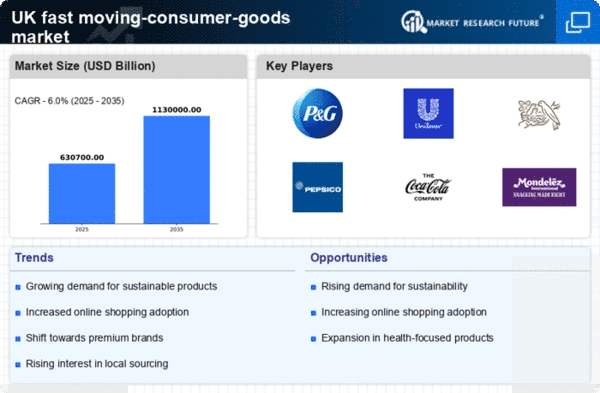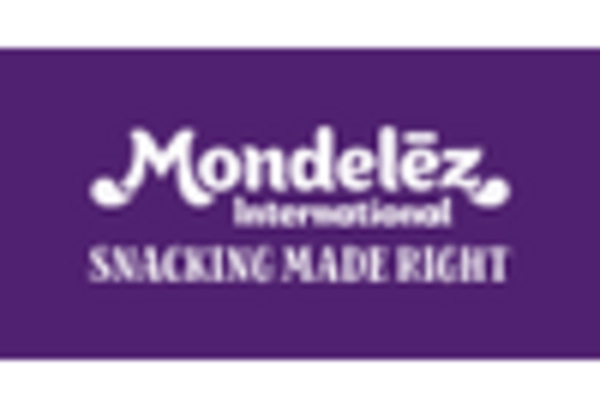Evolving Consumer Preferences
The fast moving-consumer-goods market is currently experiencing a shift in consumer preferences, with a growing inclination towards sustainable and ethically sourced products. This trend is reflected in the increasing demand for organic and eco-friendly items, which has seen a rise of approximately 15% in sales over the past year. Consumers are becoming more discerning, often prioritizing brands that align with their values. This evolution in preferences is compelling companies to adapt their product offerings and marketing strategies to cater to this conscientious consumer base. As a result, businesses in the fast moving-consumer-goods market are investing in sustainable practices and transparent supply chains to meet these expectations, thereby enhancing their brand loyalty and market share.
Rising E-commerce Penetration
The fast moving-consumer-goods market is witnessing a significant rise in e-commerce penetration, driven by changing shopping habits and the convenience of online purchasing. Recent data indicates that online sales in this sector have surged by over 30% in the last year, as consumers increasingly prefer the ease of shopping from home. This shift is prompting traditional retailers to enhance their online presence and invest in digital platforms to capture this growing segment. Additionally, the integration of advanced logistics solutions is facilitating faster delivery times, further appealing to consumers. As e-commerce continues to expand, it is likely to become a dominant channel within the fast moving-consumer-goods market.
Regulatory Changes and Compliance
Regulatory changes are increasingly influencing the fast moving-consumer-goods market, as governments implement stricter guidelines regarding product safety, labeling, and environmental impact. In the UK, recent legislation has mandated clearer labeling on food products, which has implications for manufacturers and retailers alike. Compliance with these regulations is essential for maintaining consumer trust and avoiding potential penalties. Companies are therefore investing in compliance measures and adapting their operations to align with these evolving standards. This focus on regulatory adherence not only ensures legal compliance but also enhances brand reputation in the fast moving-consumer-goods market, as consumers are more likely to support brands that prioritize safety and transparency.
Technological Advancements in Supply Chain
Technological advancements are playing a pivotal role in the fast moving-consumer-goods market, particularly in supply chain management. The integration of automation and data analytics is streamlining operations, reducing costs, and improving efficiency. For instance, the adoption of AI-driven inventory management systems has led to a reduction in stockouts by approximately 20%, allowing retailers to better meet consumer demand. Furthermore, the use of blockchain technology is enhancing traceability and transparency in the supply chain, which is increasingly important to consumers. As these technologies continue to evolve, they are likely to reshape the operational landscape of the fast moving-consumer-goods market, enabling companies to respond more swiftly to market changes.
Increased Competition and Market Consolidation
The fast moving-consumer-goods market is currently characterized by increased competition and ongoing market consolidation. Major players are acquiring smaller brands to diversify their product portfolios and enhance market reach. This trend is evident as larger companies seek to leverage the unique offerings of niche brands, thereby expanding their consumer base. Additionally, the competitive landscape is intensifying as new entrants emerge, often focusing on innovative products that cater to specific consumer needs. This dynamic environment is compelling established companies to invest in research and development, ensuring they remain relevant in the fast moving-consumer-goods market. The result is a more vibrant and diverse marketplace, albeit with challenges for smaller players.

















